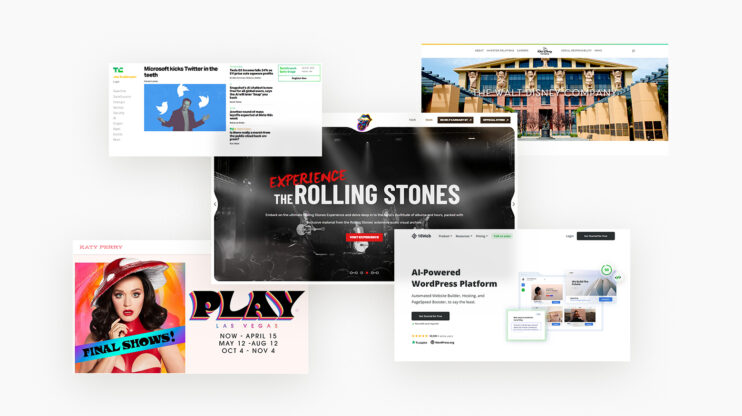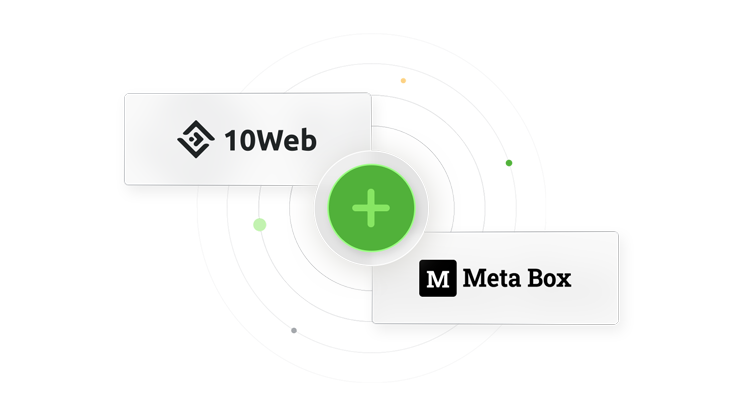
10Web is excited to announce a partnership with Meta Box that will enable both 10Web and Meta Box users to benefit from the industry-best products, enhancing their website development experience. In this comprehensive review article, we will explore the features, ease of use, performance and compatibility, pricing, and license options of Meta Box, as well as how you can benefit from the tool.
Custom fields are an integral part of WordPress architecture, offering a wide range of applications and customization options. Among the many tools available to harness the power of custom fields, the Meta Box plugin stands out as a popular and powerful option. This is why, we at 10Web are excited to announce a partnership with Meta Box. Meta Box is known for its ability to define custom meta boxes and fields and create custom post types and taxonomies, providing greater flexibility in organizing and displaying content on WordPress websites. The partnership will enable both 10Web and Meta Box users to benefit from the industry-best products, enhancing their website development experience.
In this comprehensive review article, we will explore the features, ease of use, performance and compatibility, pricing, and license options of Meta Box. By the end of this article, you will have a clear understanding of Meta Box’s capacity, helping you make an informed decision on whether it’s the right fit for your WordPress website and workflow. So let’s dive in and explore the world of Meta Box.
In This Article
Meta Box WordPress plugin features
Meta Box offers a wide range of features that make it a powerful tool for creating custom fields and extending the functionality of WordPress. With Meta Box, users can easily create custom fields such as text, textarea, checkbox, select, image, file, date, color, and more. The plugin also allows for the creation of custom post types and taxonomies, providing flexibility in organizing and displaying content on WordPress websites.
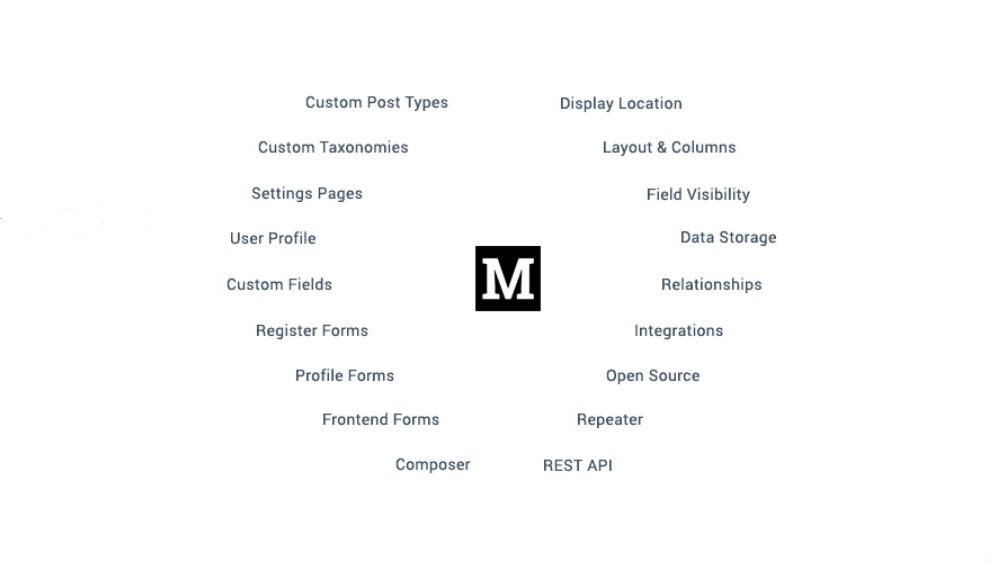
Creation of custom post types and taxonomies
When building a website, the content, and appearance of certain sections may differ from regular posts and pages. In such cases, creating custom post types and taxonomies can be the right solution.
Custom post types are unique types of content in WordPress that can be used to display content differently from posts and pages, or when the content doesn’t fit the traditional post or page format.
Custom post types can also be utilized when additional fields and characteristics are needed for specific content types.
Meta Box allows users to create custom post types and taxonomies, providing greater flexibility in organizing and displaying content on WordPress websites. Custom post types are like regular posts or pages but with their own set of custom fields, allowing for more specific content types such as testimonials. Custom taxonomies are like categories or tags but with their own set of custom fields, allowing for more specific ways of categorizing and organizing content.
To simplify the process of creating and managing custom post types and custom taxonomies in WordPress, the Meta Box plugin offers an extension. This extension provides an easy-to-use interface in the admin area, allowing you to handle all the post type arguments and taxonomy parameters, such as menu labels, admin bar labels, and search exclusions, without the need for custom PHP code.
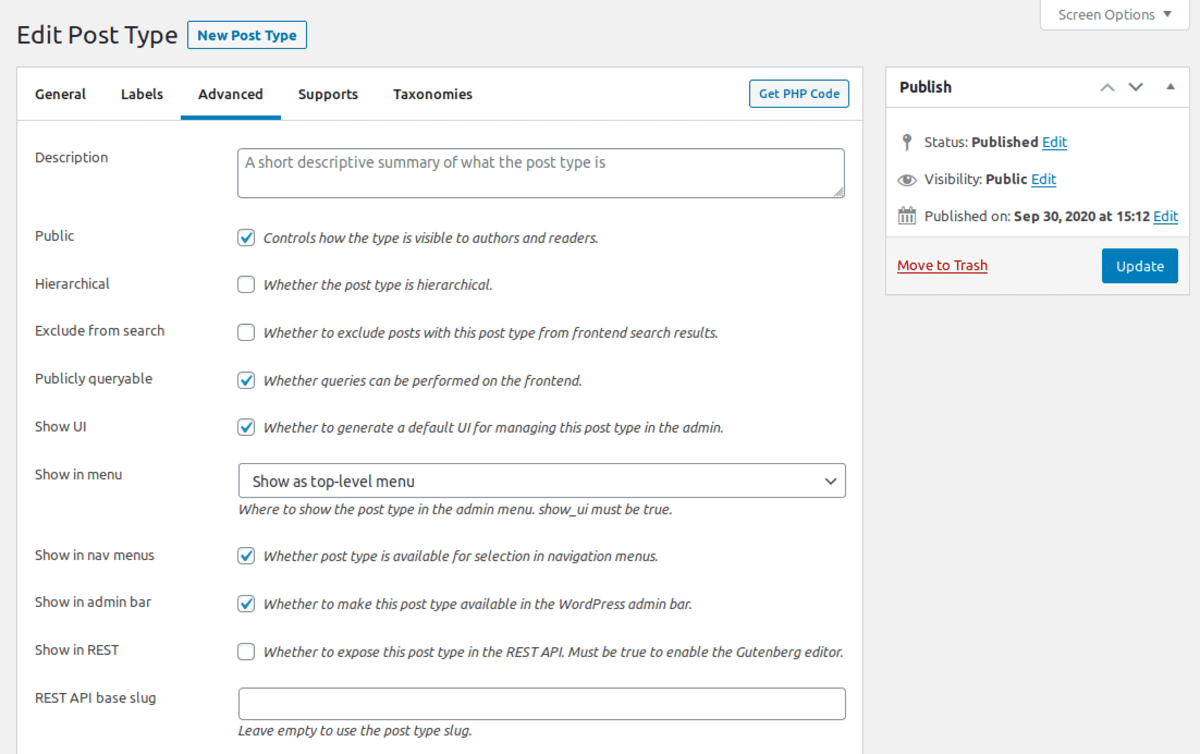
With the Meta Box extension, you can quickly configure custom post types and taxonomies to suit your needs, saving you time and effort. This plugin empowers you to transform the WordPress admin into a professional Content Management System, giving you greater control over your website’s content and appearance.
Custom field creation
With Meta Box, creating custom fields for your WordPress website becomes a breeze. Once you have set up custom post types and taxonomies, the next step is to add additional details to your posts, offering more information and enhancing the functionality of your website, such as dates, locations, addresses, ratings, prices, quantities, sizes, all depending on your website and post needs. This is where custom fields, also known as metadata, come into play, and Meta Box provides a seamless solution for managing them.
Meta Box offers a wide range of custom field types to choose from, including text, textarea, checkbox, select, image, file, date, color, and more. These custom fields can be easily added to posts, pages, custom post types, and taxonomies, providing flexibility in content creation and organization.
One of the key advantages of using Meta Box is its simplified working process with custom fields. With Meta Box, you no longer need to manually call functions, handle hooks, or filter data before saving it in the database. Additionally, for fields like groups, there is no need to rewrite JavaScript code. Instead, all you need to do is declare the information of the fields you need, and Meta Box will handle the rest, making custom field creation a seamless and efficient experience.
Unique features
Custom tables
An outstanding feature of the Meta Box plugin is its capability to store custom field data in custom tables, rather than the default WordPress post meta table. This functionality offers several benefits, particularly when dealing with substantial amounts of data or managing complex data requirements for high-traffic websites.

By utilizing custom tables, Meta Box helps optimize database performance, as the data is stored in a more structured and efficient manner. This can result in faster query execution and improved website performance. Additionally, custom tables offer better scalability, as they provide a more organized and optimized way of storing and retrieving data, which is especially beneficial for websites with high levels of traffic and complex data management needs.
Using custom tables with Meta Box can significantly enhance the performance and scalability of your WordPress website, making it an ideal solution for managing custom field data more efficiently and effectively.
Twig templates
Meta Box Views extension provides an effortless solution to render custom fields on the front end using Twig templates. Twig, a popular templating engine, offers greater flexibility and control over the presentation of custom fields, enabling users to create unique layouts, styles, and functionality to display custom field data on the front end.
With Meta Box Views, the process of rendering fields on the front end is made simple. Users can easily select the fields they want to display, fill in the required parameters, and voila! The extension supports all custom fields built with Meta Box, post fields (such as post title and post content), site settings, user fields, and query fields.
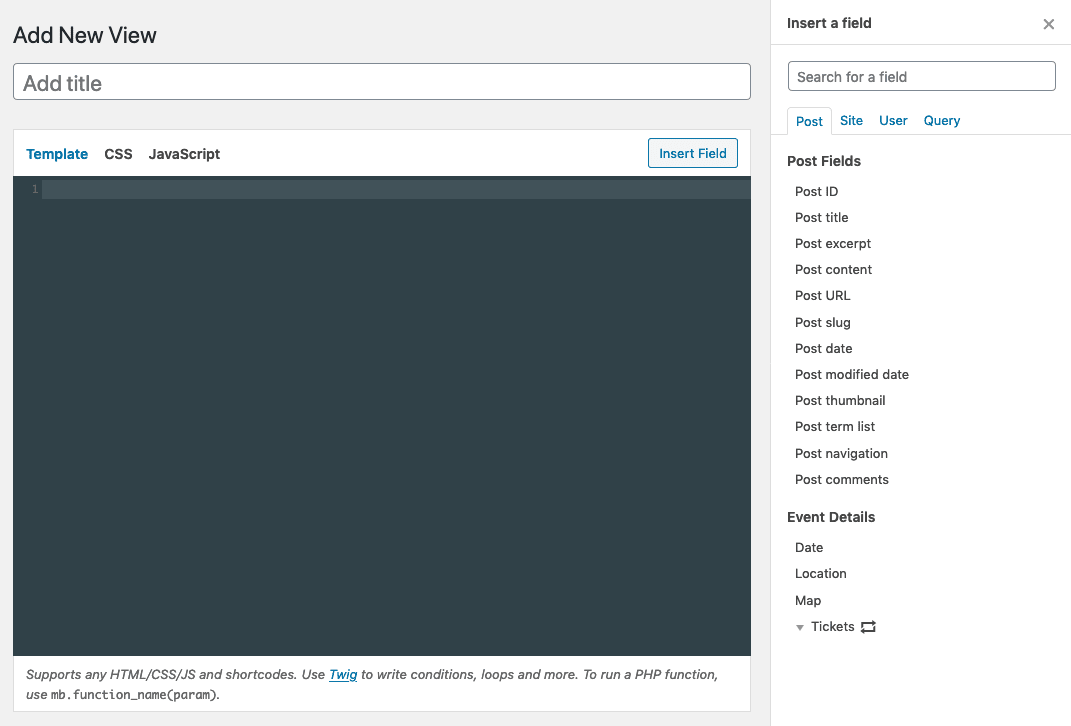
The integration of Twig in Meta Box Views provides additional capabilities, such as the ability to write conditions (if..else), control structures (for loop), and use a variety of filters to format the output effectively. With these features, users can create highly customizable frontend templates that meet their specific needs and enhance the overall user experience of their WordPress website.
User profile forms
With the Meta Box User Profile extension, you can now create user forms directly at the front end of your website, making it easier for users to edit their information. This can be especially useful for websites that require user registration and profile management, such as membership websites or online communities. Users can seamlessly update their profile information, including custom fields, providing a more user-friendly experience.
The Meta Box User Profile extension includes three shortcodes for three types of forms: login, register, and edit user profile. You can include any custom fields created by the Meta Box plugin in these forms, giving you flexibility in designing the user profile forms to suit your specific needs. There is no limitation on the number of forms or fields you can include, allowing you to create robust and customizable user profile forms for your website.
Creating user profile forms with Meta Box is made even easier with the Meta Box Builder extension. You can now create user profile forms without writing a single line of code. Simply go to Meta Boxes, click on Add New, and add the fields you want for the user profile form. Then, go to the Settings tab and select “Show meta box for users” to enable the user profile form in the front end. This streamlined process allows you to create user profile forms effortlessly, providing a seamless and efficient solution for managing user information on your website.
Frontend post submission
Gone are the days of using extensive custom code to display forms on the front end and manually managing variable data when submitting posts to your website.
With Meta Box Frontend Submission, you can create front-end forms with ease, allowing users to submit posts and custom fields without needing access to the WordPress admin area. This is especially useful for websites that require user-generated content.
Managing editor accounts and user permissions can be a cumbersome task when dealing with multiple contributors submitting content to a website. However, Meta Box Frontend Submission provides a quicker and cleaner solution by allowing custom post submissions from the front end. Submitted content can be automatically saved as drafts or published, depending on your configuration, and can be reviewed from a single location before publication. This ensures that contributors’ post submissions are neatly organized for easy and efficient publication.
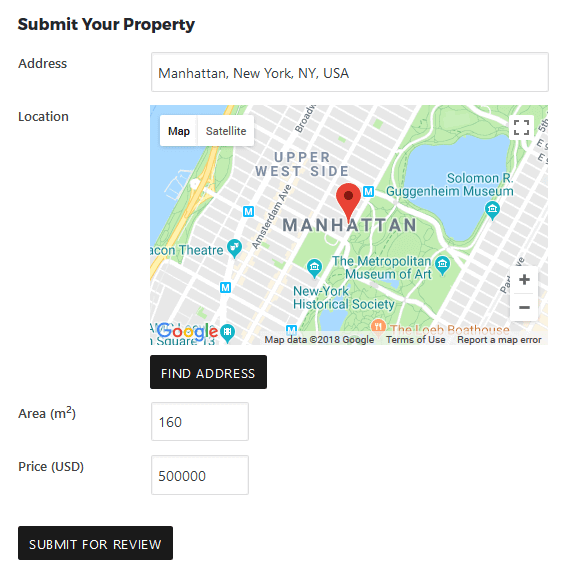
In addition to supporting custom fields and meta boxes, Meta Box Frontend Submission also fully supports post-creation and management. Users can create or edit posts without any limitations, and they also have a dashboard where they can view their submissions and edit or remove posts if needed.
Ease of use
Meta Box is a powerful tool that is designed to be user-friendly, making it accessible to both beginners and experienced users alike. Its clean and intuitive interface makes it easy to create custom fields and post types, even if you’re not a developer.
One of the standout features of Meta Box is its low-code approach, which allows users to work with the plugin using simple drag-and-drop or click manipulations. This means that even if you’re not a coder or a professional developer, you can still benefit from Meta Box and save time and effort when creating custom fields and post types. It’s a user-friendly solution that empowers everyone to create professional-looking websites, regardless of their coding skills.
In addition to its user-friendly interface, Meta Box also provides extensive documentation and tutorials on its website. This makes it easy for beginners to get started quickly and learn how to use the plugin effectively. The documentation covers various topics such as extensions, features, and common questions, ensuring that users have a comprehensive resource to refer to when needed.
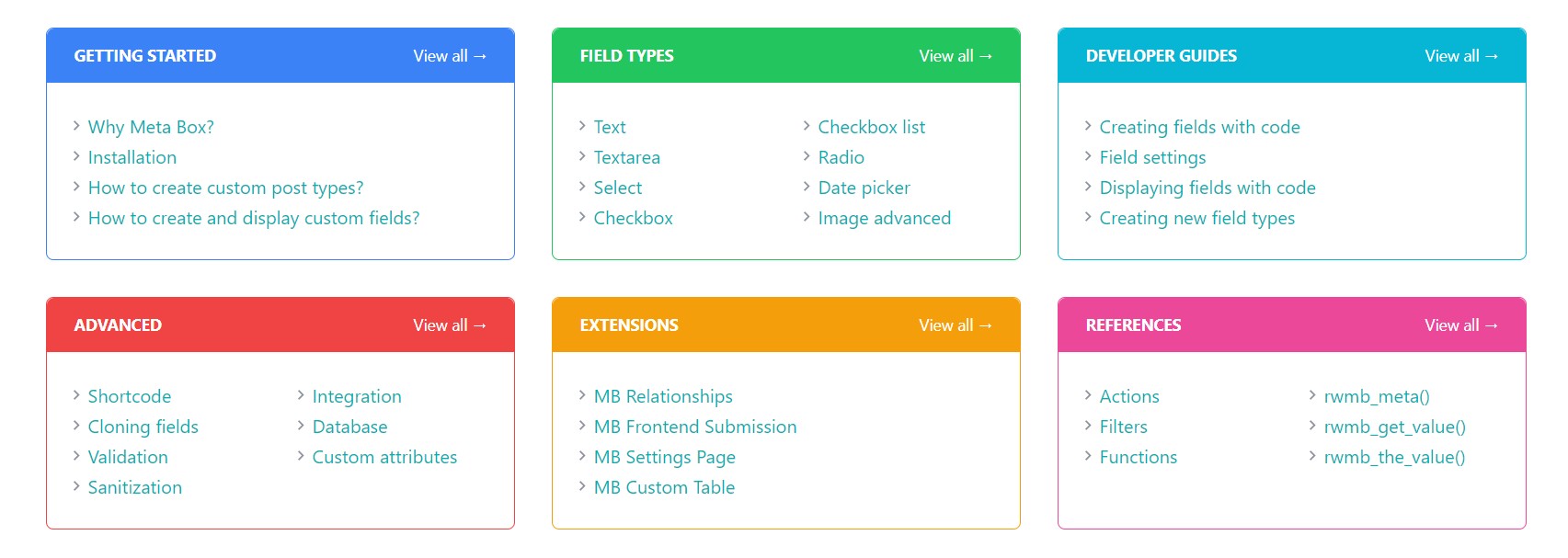
Furthermore, Meta Box offers dedicated support forums where users can seek help with any questions or issues they may encounter. This forum is staffed by industry professionals who are knowledgeable about Meta Box and can provide assistance to users at any skill level. It’s a valuable resource for getting answers to inquiries and resolving any technical issues that may arise.
Meta Box Pro users also receive access to the highly skilled and supportive Meta Box assistance team.
Compatibility and performance
The Meta Box plugin offers a remarkable level of compatibility. Meta Box is compatible with modern themes, plugins, and hosting. It has a compatibility list on its documentation website, which provides information on how it works with other popular plugins, helping users ensure seamless integration with their existing plugins and themes. Meta Box is also well-maintained and regularly updated to ensure compatibility with the latest version of WordPress.
Meta Box also ensures that it has minimal impact on website performance and speed. The plugin achieves this by utilizing code-based solutions optimized for performance, resulting in an efficient codebase that adheres to WordPress coding standards. As a result, the plugin can be easily integrated into WordPress websites, delivering seamless performance while providing the flexibility to customize website fields per specific requirements. In essence, Meta Box offers a reliable and efficient solution for customizing WordPress websites without negatively affecting their performance.
Pricing and license
Meta Box offers both free and premium versions of its plugin. While the free version provides a comprehensive set of features, Meta Box Pro goes above and beyond by offering advanced functionalities such as additional field types, integrations, and priority support. For those using the free version of Meta Box, additional features can be added with premium extensions that cost $45 each.
The pricing model for Meta Box Pro follows an annual subscription, providing users with access to updates and support for one year. However, for those who prefer ongoing access to updates and support without the need for annual renewals, Meta Box also offers a lifetime license option.
The pricing structure of Meta Box is designed to cater to different needs and budgets. There are two main license types available, along with a third Limited Time Deal (LTD) option. The basic bundle, priced at $49 annually, includes 12 popular pro extensions for one website. For users who require access to all extensions, the ultimate bundle is available at $99 per year for three websites.
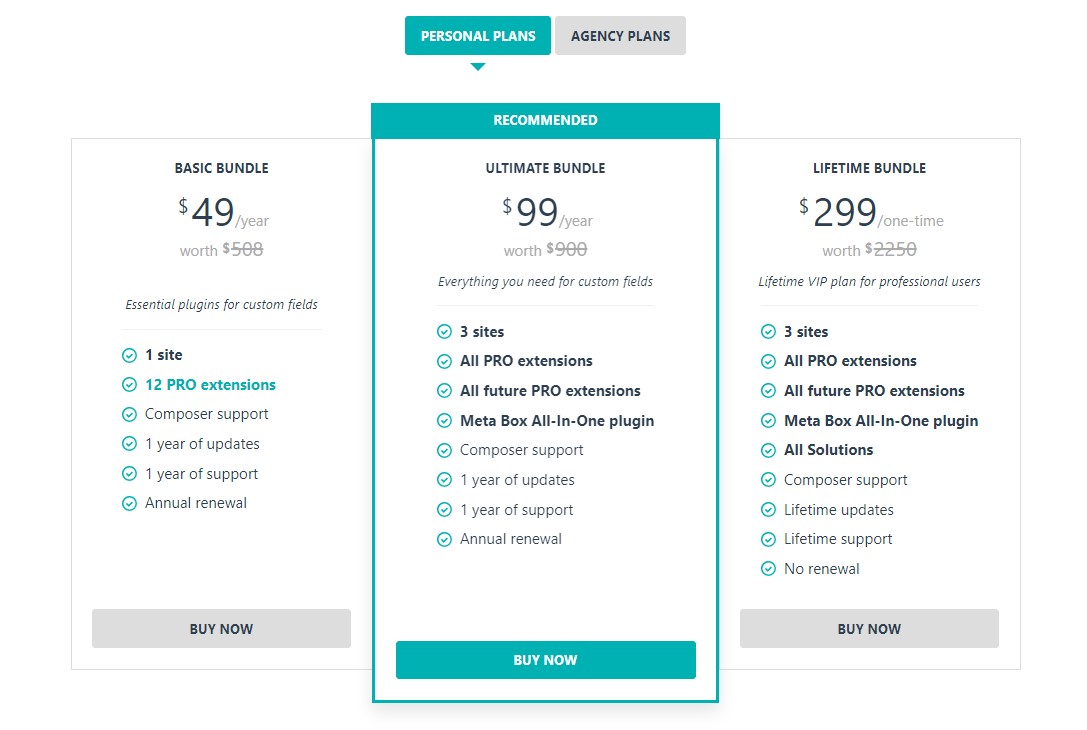
One notable advantage of Meta Box’s pricing model is its affordability for agencies. For instance, opting for just the Meta Box basic bundle costs $149 per year with 12 pro extensions for unlimited websites, providing a budget-friendly option. The ultimate bundle for agencies, a $229 per year option, provides all pro extensions for unlimited websites.
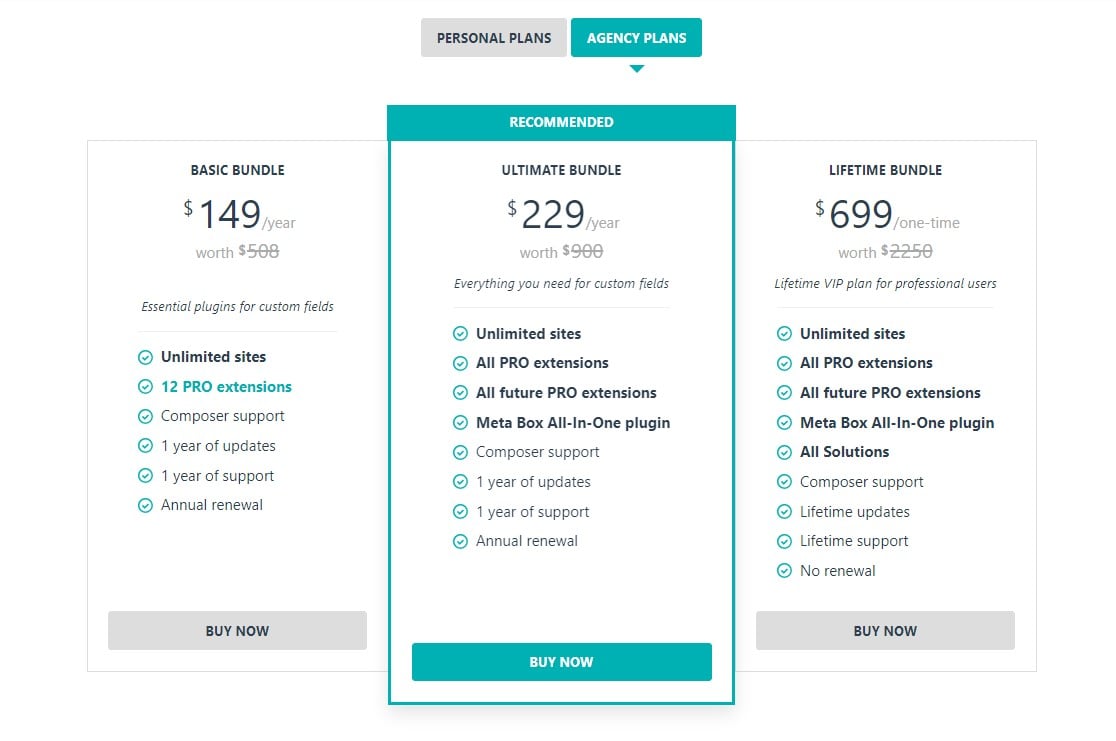
In addition, Meta Box offers a generous refund policy, allowing users to try the product without any risk. The plugin comes with a 100% satisfaction guarantee, along with a 14-day refund policy, providing users with peace of mind and confidence in their purchase decision.
One standout feature of Meta Box licensing options is the availability of a lifetime license. This unique offering provides users with unlimited access to the top-tier license, including updates and support for the entire lifespan of the product. This can be an appealing choice for users who prefer a one-time payment and continuous access to all features and updates, without the need for annual renewals. For a one-time charge of $229, you’ll gain access to all pro extensions for 3 websites, while the agency plan offers a one-time payment of $699 and access to all pro extensions on unlimited websites.
Overall, Meta Box pricing and licensing options are designed to be flexible, affordable, and user-friendly, making it accessible to a wide range of users, including agencies, developers, and individual website owners. The combination of a free version with additional premium features, competitive pricing, a generous refund policy, and the option for a lifetime license, makes Meta Box a compelling choice for those looking to enhance their WordPress websites.
Conclusion
Meta Box is a powerful WordPress plugin that offers a wide range of features for creating custom fields, custom post types, and custom taxonomies. Its unique features such as storing custom fields data in custom tables, rendering fields on the front end with Twig templates, and creating user profile forms make it stand out from other WordPress plugins. It is also easy to use, well-documented, and optimized for performance. Overall, Meta Box is recommended for users who need advanced custom field and post-type functionalities in WordPress.









